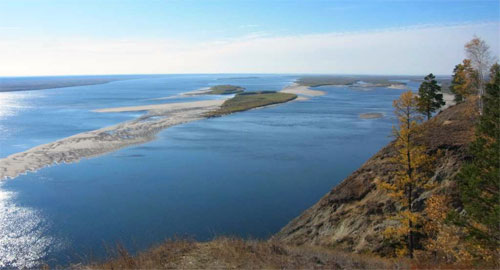
Study finds wetter Arctic could influence climate change
September 07, 2012
The Lena River near the Arctic Ocean.
Zhang and his co-authors—including IARC colleague Igor Polyakov—looked at water cycles in the Ob, Lena and Yenesei River drainages in the Eurasian Arctic during the last six decades. They found that atmospheric moisture into the areas increased by an average of 2.6 percent per decade and, consequently, river discharge increased at a rate of nearly 2 percent per decade. That means the three rivers today are dumping almost 39 cubic miles more fresh water into the Arctic Ocean per year than they did in the 1940s. Their findings are important because studies have suggested that increased air moisture and precipitation, and the resulting increase in river discharge into the Arctic Ocean, can lower salinity and cause warmer surface temperatures, as well as create weaker water circulation in the Atlantic Ocean. Those things in turn can affect multiple biological and weather systems, as well as things like sea ice and coastal erosion. The study results were published in the journal Nature Climate Change. The paper, “Enhanced poleward moisture transport and amplified northern high-latitude wetting trend,” suggests that in addition to changes in local processes such as thawing permafrost and decreasing transpiration by plants, this intensified water cycle also depends heavily on changes in large-scale atmospheric dynamics.
Source of News:
E-mail your news &
photos to editor@sitnews.us
|
||
